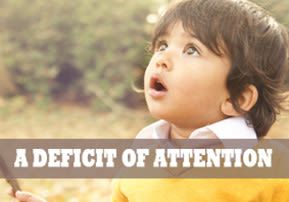
A Deficit of Attention
The school psychologist said that my child had ADHD, but the teacher and I disagreed; my daughter could sit for hours when she was interested. But she did lack attention...

Around six years’ ago, when my oldest was six, her teacher called me and told me the good news: my kid was great, sweet, clever etc. Then, she told me the bad news: she couldn’t sit still in the classroom, and the school psychologist was pushing for her to be put on to Ritalin, the class ‘A’ drug of choice for small children.
I did what all ‘good’ parents do, and I went and took my kid for an independent check up that apparently ‘confirmed’ that she had ADHD – but me and the teacher agreed it had to be wrong. She could sit for hours when she was interested, so she couldn’t be ADHD. It had to be something else, but we didn’t know what.
In the meantime, I made some massive changes to my life. I stopped working my hugely demanding job, and became a stay-at-home mother; I chucked out my internet, which instantly freed up at least an extra three  hours a day (not including work). And G-d helped me to up my praying, to an hour a day.
hours a day (not including work). And G-d helped me to up my praying, to an hour a day.
My daughter finished first grade bottom of the class, barely able to read. I got her a tutor over that Summer, I prayed a lot that G-d would help her settle down, and a miracle happened: by the end of Grade 2, she was top of the class, and going through three or four books a day.
At the time, I didn’t realize what the real ‘attention deficit’ problem actually was, namely that my career took firm precedence over my daughter. Even when I was physically ‘at home’ with her, on my day off, or on the weekend, my mind was still on my job, or stuck in my myriad worries, or preoccupied with one of my many escapism opportunities like shopping, socializing or surfing the net.
The positive attention I gave to my daughter was almost non-existent. The only times she really had my undivided (negative) attention was when she was playing up, or sick, or struggling, ergo, she played up, struggled, and was sick a lot.
So in a sense, the psych was right: my daughter DID have attention deficit problems; me, her mother wasn’t giving her anywhere near the sort of quality time and love that she really needed. Once that started to change, and once I started to put my children firmly back where they belonged, as the first priority in my life, all the ‘attention deficit’ problems disappeared.
A little while ago, I found a great website called ‘toxicpsychiatry’, which is run by a group of ethical psychiatrist MDs who are trying to alert the world to the corruption that is built into modern medicine.
In short, mind-altering drugs are big business, and the more people you can diagnose with a ‘condition’, the more drugs you can sell, and the more people you can keep hooked on your products for years and years and years.
According to that site, one in five Americans are now on some sort of anti-depressant or anti-psychotic drug, and the numbers continue to grow at a record rate. Here’s a little bit about what it has to say about ADHD:
“The scientific literature shows that 50% or more of children when given Ritalin, Focalin, Dexedrine, Adderall, and other stimulants will become obviously depressed, lethargic, weepy–but more manageable. Moreover, it’s been proven time and again that the stimulants stunt their growth. In addition, studies show that stimulants will permanently change their brain chemistry, cause shrinkage of brain tissue, predispose children to cocaine addiction in young adulthood, stigmatize them with a false diagnosis, and push them toward becoming permanent consumers of psychiatric drugs.”
Uhoh. That sounds really bad…but ADHD is a real problem, right? It’s a real medical condition, isn’t it? You can’t just do nothing…
Peter Breggin MD, writing in the New York Times a couple of years’ ago, said the following:
“The A.D.H.D. diagnosis does not identify a genuine biological or psychological disorder. The diagnosis, from the 2000 edition of the “Diagnostic and Statistical Manual of Mental Disorders,” is simply a list of behaviors that require attention in a classroom: hyperactivity (“fidgets,” “leaves seat,” “talks excessively”); impulsivity (“blurts out answers,” “interrupts”); and inattention (“careless mistakes,” “easily distractible,” “forgetful”). These are the spontaneous behaviors of normal children. When these behaviors become age-inappropriate, excessive or disruptive, the potential causes are limitless, including: boredom, poor teaching, inconsistent discipline at home, tiredness and underlying physical illness. Children who are suffering from bullying, abuse or stress may also display these behaviors in excess. By making an A.D.H.D. diagnosis, we ignore and stop looking for what is really going on with the child.”
What’s really going on with our children? That’s a tough question: it requires a lot of bravery and honesty to really start answering it, because the real question is not what’s going on with them, but what’s going on with us, their parents.
And sometimes, we just don’t want to know.
* * *
Check out Rivka Levy’s new book The Happy Workshop based on the teachings of Rabbi Shalom Arush.











10/30/2013
One of the real issues is Parents have to learn to be parents ,each child has issues we just have to deal with it , my daughter also has symptoms without the hyperactivity bit as per the list the western world use but since I am from a different world I deal with it by private tutoring , as my husband says the teachers need to up their skills . If the majority of kids have it we need to investigate not only the child but didactic skills of the teacher or is it some physical/medical of the child per se .
10/30/2013
Parents have to learn to be parents ,each child has issues we just have to deal with it , my daughter also has symptoms without the hyperactivity bit as per the list the western world use but since I am from a different world I deal with it by private tutoring , as my husband says the teachers need to up their skills . If the majority of kids have it we need to investigate not only the child but didactic skills of the teacher or is it some physical/medical of the child per se .